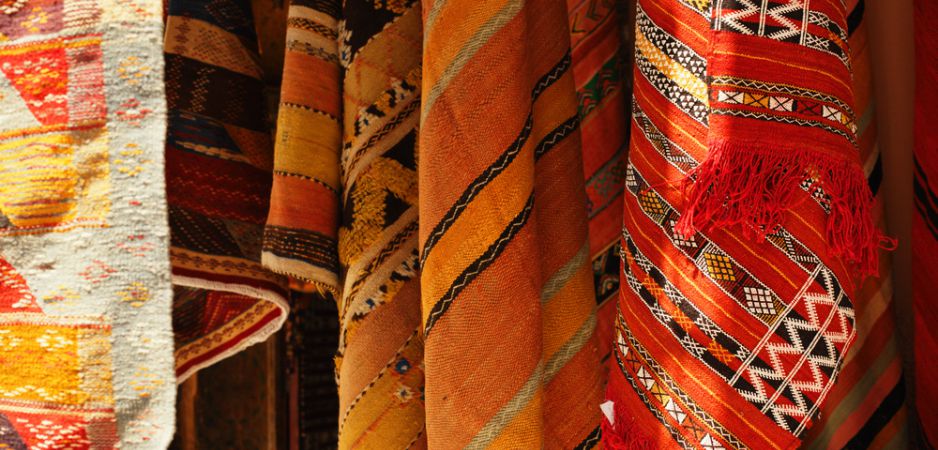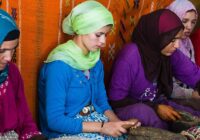Changing the way we shop for Moroccan carpets can help ensure that weavers are fairly compensated for their work.
Despite the existence of a global market for Moroccan carpets, the women who weave them often live in poverty and benefit very little economically from their craft. This is due in part to the geographic isolation of many weavers and their dependence on middlemen to link their products to customers, who are usually tourists shopping at a souq (market) in large cities like Marrakech and Fes.
There are so many intermediaries in the supply chain between weavers and the buyers of their carpets that in the end, only a small fraction of the final selling price of a carpet makes it into the pocket of its weaver. Middlemen frequently take advantage of illiterate and geographically isolated weavers, because they can count on the fact that the weavers don’t know how much their carpets are ultimately being resold for. Oftentimes, rural weavers feel unable to demand a higher price from a middleman, who they fear may be the only potential buyer of their carpets in the foreseeable future.
Weavers utilize various strategies to overcome these barriers to profiting from their craft. Many organize in cooperatives, which allow them to benefit from increased access to resources, including better looms, higher quality yarn and a variety of training opportunities, as well as access to a more consistent market for their products.
Cooperatives usually sell their carpets at exhibitions, in bulk to clients with whom they have relationships and even online, eliminating the need for individual weavers to spend long, hot days sitting at the souq, trying to sell their carpets for at least enough to cover the cost of yarn. Some weavers also prefer the community and solidarity they find weaving in a group with other women to weaving alone in their homes.
Anou
Some weaving cooperatives take advantage of a website called Anou, which describes itself as an online platform for Moroccan artisans to sell their products directly to consumers all over the world, eliminating the need for middlemen and/or fair trade organizations to connect artisans to customers.
Eliminating intermediaries usually increases artisans’ profits, and this has certainly been the case for many weaving cooperatives in rural Morocco. Some have had so much success selling on Anou that they use it almost exclusively and have been able to stop relying on less profitable venues for selling their work. Founded by Dan Driscoll, Anou hopes to start connecting with more and more cooperatives in the years to come.
Despite their promise, cooperatives aren’t always the rosy solution to weavers’ problems that they are sometimes marketed to be. Many cooperatives are led by a few women (or even men) who treat the cooperative as a private enterprise, in which they profit from the work of other weavers, who they pay just enough to keep them coming back to work.
As part of an effort to formalize the work of rural artisans, the Moroccan government strongly encourages artisans to organize in cooperatives, but its places less emphasis on regulating the cooperatives and ensuring that their members are adhering to the standards and principles of the business model.
Under Moroccan law, all cooperatives are required to hold a general assembly once a year, in which they elect their leadership and make decisions about how they share profits among their members. In reality, many cooperatives ignore this requirement. Their leadership makes decisions unilaterally, taking advantage of the desperate situation of other weavers, who have very few options for paid work. Unfortunately, for many weavers, joining a cooperative sometimes merely replaces one form of exploitation with another.
Changing the Way We Buy
Given that a market for Moroccan carpets clearly exists—as evidenced, for example, by the success of Anou, and the steep prices many tourists are willing to pay in the souqs of Marrakech and Fes—the challenge is not so much in making people want to buy Moroccan carpets, but in changing the way they purchase them.
Women weavers put vast amounts of time, resources and energy into the creation of their carpets, and an unwillingness to compensate them for much beyond the cost of their yarn speaks loudly about our global community’s respect (or lack thereof) for their artistry and the important roles they play as preservers of a revered piece of Moroccan cultural heritage. People love to talk about the importance of preserving traditional handicrafts such as carpet weaving and passing them on to future generations, but how do we expect artisans to continue practicing crafts, on a large scale, that they are hardly compensated for?
For tourists who are interested in purchasing a Moroccan carpet directly from its source, the best way to do so is to travel to a cooperative and buy it from the weavers for the price they are asking, or from a weaver selling her work directly at the souq. Some cooperatives are quite remote, but others are located in towns and villages not far from major Moroccan cities. A trip to one of these towns or villages is sure to be a worthwhile travel experience, as well.
Of course, not everyone who wants to purchase a Moroccan carpet is able to travel directly to its source. For those customers, shopping online at Anou or at the ensembles artisanales in most major Moroccan cities is a good alternative.
Changing the way we shop for Moroccan carpets can help ensure that weavers are fairly compensated for their work.
The views expressed in this article are the author’s own and do not necessarily reflect Fair Observer’s editorial policy.
Photo Credit: Elena Moiseeva / Ekaterina Pokrovsky / Shutterstock.com
 We bring you perspectives from around the world. Help us to inform and educate. Your donation is tax-deductible. Join over 400 people to become a donor or you could choose to be a sponsor.
We bring you perspectives from around the world. Help us to inform and educate. Your donation is tax-deductible. Join over 400 people to become a donor or you could choose to be a sponsor.
Support Fair Observer
We rely on your support for our independence, diversity and quality.
For more than 10 years, Fair Observer has been free, fair and independent. No billionaire owns us, no advertisers control us. We are a reader-supported nonprofit. Unlike many other publications, we keep our content free for readers regardless of where they live or whether they can afford to pay. We have no paywalls and no ads.
In the post-truth era of fake news, echo chambers and filter bubbles, we publish a plurality of perspectives from around the world. Anyone can publish with us, but everyone goes through a rigorous editorial process. So, you get fact-checked, well-reasoned content instead of noise.
We publish 2,500+ voices from 90+ countries. We also conduct education and training programs
on subjects ranging from digital media and journalism to writing and critical thinking. This
doesn’t come cheap. Servers, editors, trainers and web developers cost
money.
Please consider supporting us on a regular basis as a recurring donor or a
sustaining member.
Will you support FO’s journalism?
We rely on your support for our independence, diversity and quality.







